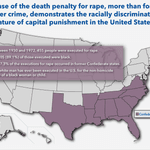Race
Race, Rape, and the Death Penalty

The Historically Discriminatory Use of the Death Penalty for Rape
Perhaps more than any other crime, the historical use of the death penalty for rape demonstrates the racially discriminatory nature of capital punishment in the United States and its overtly racist underpinnings as an outgrowth of slavery and lynching. This history is set out in detail in the amicus brief filed jointly by the American Civil Liberties Union, the ACLU of Louisiana, and the NAACP Legal Defense and Educational Fund in Kennedy v. Louisiana, the 2008 case in which the U.S. Supreme Court ruled that the death penalty was unconstitutional for any crime in which the victim was not killed, including the rape of a child.
Historically, the use of the death penalty for rape has been a Southern phenomenon that has been applied overwhelmingly against black defendants, and overwhelmingly in cases involving charges of raping a white woman or child. DPIC is not aware of any case in the United States in which a white man has been executed for raping, but not killing, a black woman or child. While the rape of a white woman was a capital offense in all of the Slave States, no whites convicted of rape are known to have been executed under these statutes. In most Slave States, the attempted rape of a white woman also was a capital offense for blacks, but not whites. A slave owner had the legal right to compel sex with his slaves, and the rape of an enslaved black woman or girl by those who were not her master was considered a property crime. The ACLU/NAACP Legal Defense Fund amicus brief notes that the 1816 Georgia penal code “expressly provided that rape committed by a white man would be punished by a term of imprisonment of not more than twenty years, and attempted rape by not more than five years, but that slaves and ‘free persons of color’ were to be put to death for the crimes of rape or attempted rape of a free white female.”
Following the Civil War and emancipation, extrajudicial executions — lynchings — were common. The Equal Justice Initiative’s report, Lynching in America, “documented 4075 racial terror lynchings in twelve Southern states between the end of Reconstruction in 1877 and 1950,” nearly one quarter of which were based on charges of sexual assault. Hundreds more blacks were lynched for minor social transgressions including unintentionally bumping into a white woman.
Judicial executions for rape in the 20th Century reflect the continuing link to race and the legacy of slavery and lynching. According to statistics compiled by the federal government, 455 people were executed for rape in the United States between 1930 and the Supreme Court’s decision overturning existing death penalty statutes in 1972. 405 (89.1%) were black. The use of the death penalty for rape remained almost exclusively a Southern phenomenon: 443 of the executions for rape (97.4%) occurred in former Confederate states.